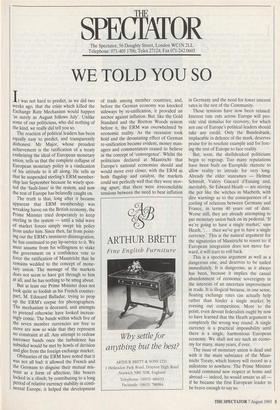SPECTATOR OR
The Spectator, 56 Doughty Street, London WC1N 2LL Telephone: 071-405 1706; Telex 27124; Fax 071-242 0603
WE TOLD YOU SO
It was not hard to predict, as we did two weeks ago, that the crisis which killed the Exchange Rate Mechanism would happen `as surely as August follows July'. Unlike some of our politicians, who did nothing of the kind, we really did tell you so.
The reaction of political leaders has been equally easy to predict, and transparently dishonest. Mr Major, whose proudest achievement is the ratification of a treaty enshrining the ideal of European monetary union, tells us that the complete collapse of European monetary policy is a vindication of his attitude to it all along. He tells us that he suspended sterling's ERM member- ship last September because he wisely spot- ted the 'fault-lines' in the system, and now the rest of Europe has belatedly caught on.
The truth is that, long after it became apparent that ERM membership was wreaking havoc on the British economy, the Prime Minister tried desperately to keep sterling in the system — until a tidal wave of market forces simply swept his policy from under him. Since then, far from point- ing out the ERM's imminent disintegration, he has continued to pay lip-service to it. We must assume from his willingness to stake the government on a confidence vote to force the ratification of Maastricht that he remains wedded to the concept of mone- tary union. The message of the markets does not seem to have got through to him at all, and he has nothing to be smug about.
But at least our Prime Minister does not look quite so foolish as his French counter- part, M. Edouard Balladur, trying to prop up the ERM's corpse for photographers. The mechanism is deceased, and attempts to pretend otherwise have looked increas- ingly comic. The bands within which five of the seven member currencies are free to move are now so wide that they represent no constraint at all. Any attempt to redraw narrower bands once the turbulence has subsided would be met by howls of derision and glee from the foreign exchange market.
Obituaries of the ERM have noted that it was not all bad: it allowed the French and the Germans to disguise their mutual mis- trust as a form of affection, like boxers locked in a clinch; by contributing to a long period of relative currency stability in conti- nental Europe, it helped the development of trade among member countries; and, before the German economy was knocked sideways by re-unification, it provided an anchor against inflation. But, like the Gold Standard and the Bretton Woods system before it, the ERM was overwhelmed by economic reality. As the recession took hold and the devastating effect of German re-unification became evident, money man- agers and commentators ceased to believe in the concept of 'convergence'. Whilst the politicians declared at Maastricht that Europe's national economies should and would move ever closer, with the ERM as both flagship and catalyst, the markets could see perfectly well that they were mov- ing apart; that there were irreconcilable tensions between the need to beat inflation in Germany and the need for lower interest rates in the rest of the Community.
Those tensions have now been relaxed. Interest rate cuts across Europe will pro- vide vital stimulus for recovery, for which not one of Europe's political leaders should take any credit. Only the Bundesbank, implacable in defence of the mark, deserves praise for its resolute example and for forc- ing the rest of Europe to face reality.
But, soon, the shellshocked politicians begin to regroup. Too many reputations have been built on Europhile rhetoric to allow reality to intrude for very long. Already the elder statesmen — Helmut Schmidt, Valery Giscard d'Estaing and, inevitably, Sir Edward Heath — are stirring the pot like the witches in Macbeth, with dire warnings as to the consequences of a cooling of relations between Germany and France, in terms 40 years out of date. Worse still, they are already attempting to put monetary union back on its pedestal. 'If we're going to have a single market,' says Heath, `. . . then we've got to have a single currency.' This is the natural argument for the signatories of Maastricht to resort to: if European integration does not move for- ward, it will start to roll back.
This is a specious argument as well as a dangerous one, and deserves to be nailed immediately. It is dangerous, as it always has been, because it implies the casual abandonment of economic sovereignty in the interests of an uncertain improvement in trade. It is illogical because, in one sense, floating exchange rates can actually help rather than hinder a single market by evening out competition. More to the point, even devout federalists ought by now to have learned that the Heath argument is completely the wrong way round. A single currency is a practical impossibility until there is a single, harmonious European economy. We shall not see such an econo- my for many, many years, if ever.
The issue of monetary union is dead and with it the main substance of the Maas- tricht Treaty, which history will record as a milestone to nowhere. The Prime Minister would command new respect at home and abroad — indeed, he would amaze us all if he became the first European leader to be brave enough to say so.


















































 Previous page
Previous page